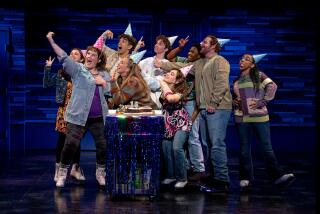STAGE REVIEW : ‘Once on This Island’ an Undemanding Musical
A lot of hoopla attended the 1990 Off-Broadway surprise of a small musical called “Once on This Island.” Loosely based on Rosa Guy’s Caribbean-flavored novel, “My Love, My Love,” which in turn is loosely based on Hans Christian Andersen’s “The Little Mermaid,” it was part of a late spring festival of new work at Playwrights Horizons. On the strength of its giddy reception there, it was moved to Broadway that fall.
Not everyone agreed that it was a good move. Broadway was having a particularly bad year and its push for a hit was understandable. But in its Southern California opening at the Wilshire Theatre Wednesday, “Once on This Island’s” modest origins were showing. It is dwarfed by a large theater. This is a small-scale 95-minute exercise in nonstop song and dance that is a tribute to director-choreographer Graciela Daniele’s inventiveness though it is by no means her best work. Where is the complexity of her dance creations for “Dangerous Games”?
One might argue that “Once on This Island” doesn’t command it. And indeed it doesn’t. “Island” is a classic but simple story of star-crossed love and unbridgeable class distinctions: the tale of a peasant girl named Ti Moune (played as a child by Nilyne Fields, as an adult by Vanita Harbour), who nurses the son of the island’s most affluent family back to health after he’s crashed his car into a tree--and falls in love with him.
The son, Daniel (Darius de Haas), has been betrothed since childhood to Andrea (Monique Cintron), a woman of his own class. And although Daniel falls for Ti Moune as intensely as she does for him, he is ready to obey his father and marry Andrea to whom he is also strongly attracted.
The tormented Ti Moune, who had offered up her life for Daniel’s to the God of Death (a leering Gerry McIntyre), is given one chance to take it back--by killing her faithless lover. Unable to do that, she is turned into a tree.
There are lots of gods running around this island and they serve many uses, as villagers or occasional characters, on demand.
The pace never flags.
Stephen Flaherty’s score is a continuous medley of Caribbean/calypso rhythms beautifully orchestrated by Michael Starobin, but from which only two or three songs manage to emerge.
The first is “One Small Girl” near the top of the show, when the young Ti Moune is found alive after a devastating storm and is adopted by Mama Euralie (Sheila Gibbs) and her husband Tonton Julian (Miles Watson). The second is “Forever Yours,” at which the three-way compact is made among Ti Moune, Daniel and Death. And finally, “Ti Moune,” a tender song of separation during which her parents ruefully agree to let her go and find her love. Coming roughly midway through the show, it is the first song to touch the heart.
That should tell you something about what is fundamentally wrong with the piece--namely, a precious book by Lynn Ahrens that makes these characters one-dimensional and insists on a bludgeoning affectation of innocence that the company abets with wide-eyed self-consciousness.
That may partially be an effort on their part to overcome the size of the hall, but the attitude is close to patronizing, an offense one might have thought difficult to commit in the ‘90s.
Harbour, Watson and the imposing McIntyre, all of whom sing and move well, are especially susceptible to such broad overreaction. Yet the ensemble collectively seems to be obeying some unseen god of coyness and happy-camper, fairy-tale charisma can get cloying.
This said, one admires the energy of Daniele’s whirling-dervish approach and the simplicity of the context: A bare stage, dressed with Loy Arcenas’ deliberately childlike painted drops--and one magically translucent drape--presumably designed to reflect the folk/fairy-tale origins of the piece.
These might have been too primitive without Allen Lee Hughes’ artfully moody and changeable lights, while Judy Dearing’s costumes deliver the predictably vivid primary colors of the Caribbean.
As long as we’re in the French Antilles, the word petillant comes to mind to describe the energy and spirit of the piece. And as long as we’re dipping into a wine vocabulary, “Once on This Island” is no 1961 Chateau Latour, but a sprightly Beaujolais Nouveau.
To each his own palate.
“Once on This Island,” Wilshire Theatre, 8440 Wilshire Blvd., Beverly Hills. Tuesdays-Saturdays, 8 p.m.; Sundays, 7 p.m.; Saturdays-Sundays, 2 p.m. Ends Aug. 16. $18-$40; (213) 480-3232), (714) 840-4000). Running time: 1 hour, 35 minutes.
Vanita Harbour: Ti Moune
Nilyne Fields: Little Ti Moune
Sheila Gibbs: Mama Euralie
Miles Watson: Tonton Julian
Darius de Haas: Daniel
Monique Cintron: Andrea
Keith Tyrone: Armand
A new musical based on Rosa Guy’s novel, “My Love, My Love,” presented the Los Angeles Civic Light Opera Assn. Producers Tom Mallow, ATP/Dodger, Pace Theatrical Group Inc. and the John F. Kennedy Center for the Performing Arts, in association with the Shubert Organization, Capital Cities/ABC Inc., Suntory International Corp., James Walsh and Playwrights Horizons. Executive producer George MacPherson. Book and lyrics Lynn Ahrens. Music Stephen Flaherty. Director/choreographer Graciela Daniele. Associate choreographer Willie Rosario. Sets Loy Arcenas. Lights Allen Lee Hughes. Costumes Judy Dearing. Sound Scott Lehrer. Orchestrations Michael Starobin. Musical supervision Steve Marzullo. Musical director Mark Lipman. Production stage manager Bryan Young.
More to Read
The biggest entertainment stories
Get our big stories about Hollywood, film, television, music, arts, culture and more right in your inbox as soon as they publish.
You may occasionally receive promotional content from the Los Angeles Times.










